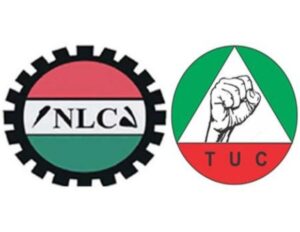 The Nigeria Labour Congress (NLC) in the North West zone has put forth a proposal for a minimum wage of N485,000 for every worker. This significant proposition was disclosed in a position paper signed by the Kano NLC Chairman, Kabiru Inuwa, on behalf of the labor leaders.
The Nigeria Labour Congress (NLC) in the North West zone has put forth a proposal for a minimum wage of N485,000 for every worker. This significant proposition was disclosed in a position paper signed by the Kano NLC Chairman, Kabiru Inuwa, on behalf of the labor leaders.
Following a Zonal public hearing on the minimum wage review, the position paper was made available to the press in Kano.
According to Inuwa, the proposed minimum wage takes into account the prevailing economic realities and aims to ensure that workers (specifically, those supporting a family of six) are provided with an income that is sufficient for their survival within the zone. The North West geo-political zone of Nigeria has been grappling with a range of economic challenges, including banditry, high unemployment rates, and hyperinflation. The recent removal of fuel subsidy and the forex policy have further exacerbated the situation, affecting a majority of individuals in the zone. Peasant farmers, for instance, find it increasingly difficult to irrigate their farms due to the soaring cost of petrol, while the prices of fertilizers surpass the purchasing power of most.
Recognizing the dynamic nature of the national economy, the NLC emphasizes the need for a new minimum wage that not only reflects the cost of living but also ensures a decent standard of living for workers. To determine the proposed new minimum wage per month, a comprehensive assessment of the current economic conditions, inflation rates, and the basic needs of workers and their families is deemed necessary. The NLC asserts that for a minimum wage to serve its purpose, it must align with the economic realities and sufficiently provide for the survival of a family of six.
To ensure the continued relevance and responsiveness of the minimum wage to economic changes, the NLC underscores the importance of a mechanism for regular review. It proposes a biennial review of the minimum wage, taking into account inflation rates, cost of living adjustments, and other pertinent economic indicators. This review process should involve consultations with labor unions, government representatives, and economic experts to guarantee a fair and transparent procedure.
Furthermore, the NLC calls for the intervention of the federal government to enforce compliance by withholding all allocations to any state or public institution that violates the minimum wage law.
Addressing the hardships faced by workers and the general population due to the removal of fuel subsidy and unfavorable forex policies necessitates a comprehensive approach. The proposed new minimum wage, accompanied by a review mechanism and penalties for non-compliance, represents crucial steps toward ensuring fair and decent wages for workers. The well-being of workers and the masses must be prioritized in shaping wage policies, as this will promote social justice and economic stability, as stated by Inuwa.

